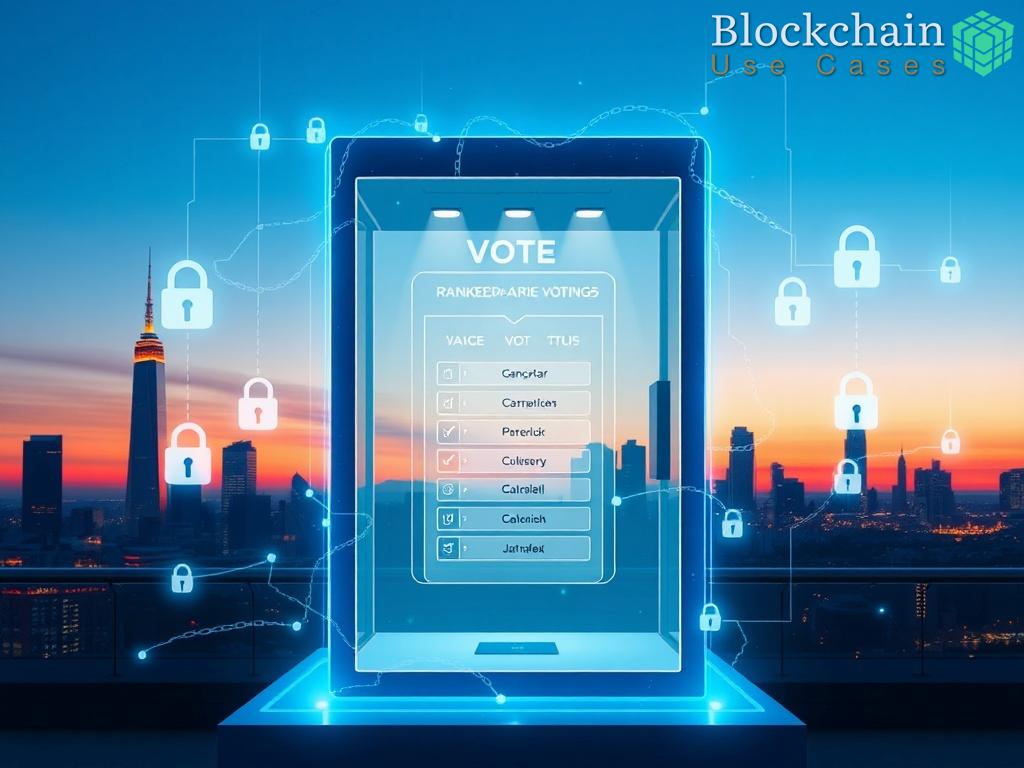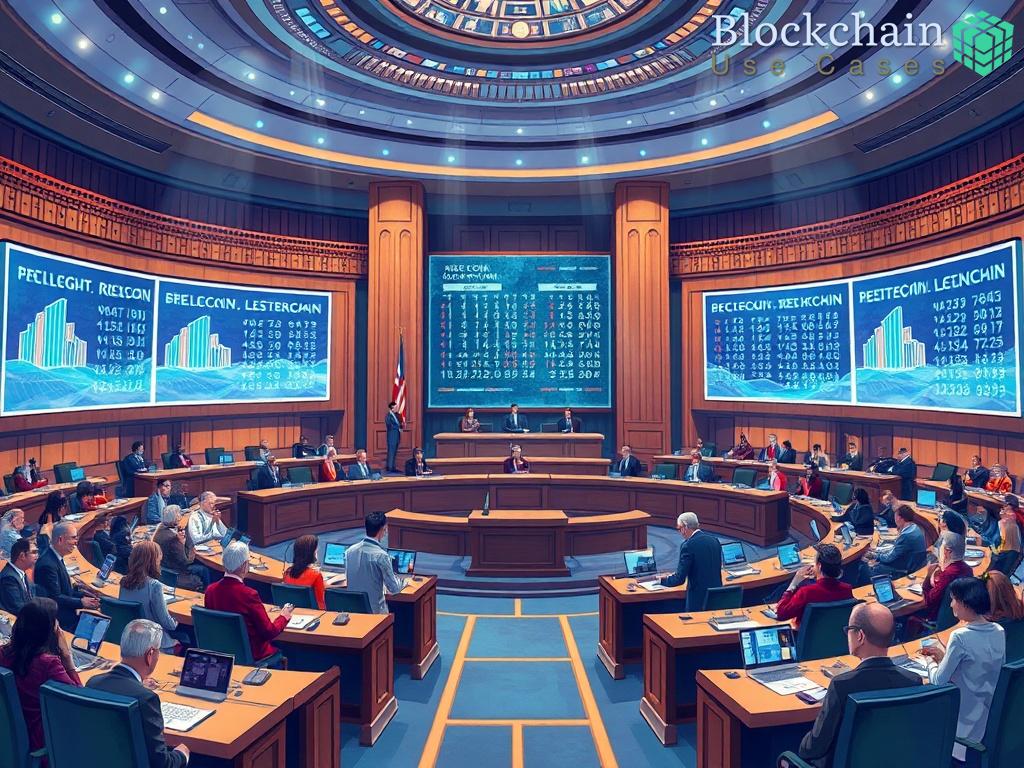The Role of Blockchain in Employee Surveys

In the evolving landscape of employee engagement, organizations increasingly recognize the importance of gathering candid feedback from their workforce. Traditional survey methods often suffer from issues of trust, data integrity, and anonymity. Enter blockchain technology, a revolutionary tool that promises to enhance the way companies conduct employee satisfaction surveys. By leveraging the decentralized nature of blockchain, organizations can ensure that feedback is collected transparently and securely, fostering an environment of trust.
One of the most significant advantages of utilizing blockchain for employee surveys is the enhancement of data integrity. In a world where data breaches and manipulation are prevalent, blockchain’s immutable ledger provides a robust solution. Each response is encrypted and stored in a decentralized network, making it nearly impossible for malicious actors to alter the data.
Moreover, the security protocols inherent in blockchain technology ensure that sensitive employee feedback is protected from unauthorized access. This heightened security not only safeguards individual responses but also encourages employees to provide honest and constructive feedback without fear of repercussions.
Employee surveys often fail to generate genuine insights due to fears of identification and retaliation. Blockchain addresses this concern effectively by allowing employees to participate anonymously while still ensuring that their feedback is accurately recorded. Smart contracts can be employed to facilitate the survey process, automating the collection and analysis of responses without revealing the identity of the respondents.
The use of blockchain in this context fosters a culture of trust within organizations, as employees can be assured that their voices will be heard without the risk of being singled out. This trust is crucial for obtaining meaningful insights that can drive organizational change and improve employee satisfaction.
The integration of blockchain technology into employee satisfaction surveys offers several key advantages, which are outlined in the table below:
| Advantage | Description |
|---|---|
| Data Integrity | Immutable records ensure that responses cannot be altered or deleted. |
| Enhanced Security | Encryption and decentralized storage protect sensitive information from breaches. |
| Anonymity | Employees can provide feedback without fear of identification or retaliation. |
| Increased Trust | Transparency in the process fosters a culture of trust between employees and management. |
| Real-time Analysis | Smart contracts can facilitate immediate analysis of survey results, allowing for quick action. |
Enhancing Data Privacy through Decentralization

As organizations continue to explore innovative methods for conducting employee satisfaction surveys, the importance of data privacy becomes increasingly evident. Traditional survey methods often expose sensitive employee information to potential misuse, leading to apprehension among employees regarding the safety of their feedback. Decentralized platforms, powered by blockchain technology, present a transformative solution that not only prioritizes data privacy but also empowers employees to express their opinions freely.
Decentralization inherently eliminates central points of failure, ensuring that data is distributed across a network rather than stored in a single repository. This architecture not only enhances security but also fortifies privacy, making it significantly more challenging for unauthorized entities to access sensitive information.
In the realm of employee feedback, the guarantee of privacy is paramount. By utilizing decentralized platforms, organizations can implement advanced cryptographic techniques to safeguard employee responses. Each piece of feedback is encrypted and stored in a manner that only the intended parties can access. This mechanism effectively mitigates the risk of data breaches and unauthorized access, fostering a sense of security among employees.
Furthermore, decentralized systems can employ zero-knowledge proofs, allowing for verification of data without revealing the actual content. This means that organizations can confirm the integrity of the feedback collected without compromising the anonymity of the employees. As a result, employees can be confident that their insights will remain confidential, encouraging honest and constructive feedback.
Decentralized platforms not only enhance privacy but also empower employees by giving them control over their data. Unlike traditional systems, where organizations usually dictate the handling of feedback, decentralized systems allow employees to determine how their information is shared and utilized. This shift in control is crucial for cultivating a culture of transparency and trust within organizations.
By participating in decentralized employee surveys, employees are more likely to engage in the process, knowing they have a say in how their feedback is managed. This empowerment fosters a proactive approach to employee satisfaction, as individuals feel their contributions are valued and respected.
Consider the following advantages that decentralized platforms offer in enhancing data privacy for employee satisfaction surveys:
- Improved Security: Data is encrypted and stored across multiple nodes, reducing the risk of unauthorized access.
- Employee Control: Individuals have the autonomy to manage their own feedback, fostering trust and engagement.
- Transparency: The decentralized nature promotes openness in the survey process, building confidence among employees.
- Resilience: With no central point of failure, the system remains robust against potential attacks.
In conclusion, the integration of decentralized platforms into employee satisfaction surveys not only enhances data privacy but also cultivates a culture of trust and empowerment. Organizations that embrace this innovative approach position themselves to foster genuine engagement and satisfaction among their workforce.
Incentivizing Participation in Feedback Mechanisms
In a landscape where employee engagement is paramount, organizations are increasingly seeking innovative methods to encourage participation in feedback mechanisms. Traditional approaches often struggle to motivate employees to share honest insights, but decentralized platforms, powered by blockchain technology, have the potential to transform this dynamic. By providing a secure and transparent environment, these platforms not only protect employee feedback but also offer unique opportunities for incentivization that can drive participation rates significantly.
Creating a Culture of Engagement is essential for any organization aiming to foster a productive workforce. Decentralized platforms inherently promote a sense of ownership and transparency, which can be further enhanced by introducing various incentive structures. For instance, organizations can implement reward systems that acknowledge employees for their participation in surveys. These rewards could range from recognition points to tangible benefits such as gift cards or additional time off. By aligning incentives with participation, companies can create a compelling reason for employees to engage actively in the feedback process.
Leveraging Gamification Techniques is another effective strategy for motivating employees to participate in satisfaction surveys. By incorporating elements of gamification, such as leaderboards, badges, and challenges, organizations can make the feedback process more enjoyable and engaging. When employees see their participation recognized in a fun and interactive manner, it encourages not only individual involvement but also fosters a spirit of healthy competition among peers. This approach can significantly enhance response rates, leading to richer and more diverse feedback.
Moreover, the decentralized architecture of these platforms ensures that the entire process remains secure and anonymous, allowing employees to provide feedback without fear of repercussions. When employees feel safe and valued, they are more likely to contribute openly, knowing that their insights will be treated with respect and confidentiality. This empowerment ultimately leads to a more engaged workforce, which is essential for organizational success.
Real-time Analytics and Reporting on Employee Insights
As organizations strive to adapt to the rapid changes in the workplace, the integration of real-time analytics within decentralized platforms is becoming a game-changer in managing employee satisfaction surveys. The ability to collect and analyze data instantly allows organizations to respond to employee concerns more effectively and make informed decisions that drive engagement and satisfaction.
Real-time analytics not only transforms the speed at which organizations can assess employee feedback but also enhances the quality of insights derived from that data. By utilizing decentralized systems, companies can leverage sophisticated algorithms and data visualization techniques to present feedback in a way that is easily digestible. This immediacy enables management to grasp the sentiments of their workforce and identify trends as they emerge, rather than waiting weeks or months for traditional survey results.
The integration of real-time analytics fosters a culture of continuous feedback within organizations. Employees can see how their responses contribute to broader trends, encouraging them to participate more actively in the feedback process. This dynamic creates a feedback loop that is not only responsive but also engaging, as employees recognize that their voices have a direct impact on organizational decisions. With decentralized platforms, organizations can implement dashboards that display live data, providing both management and employees with a transparent view of satisfaction levels.
Furthermore, the richness of data provided by real-time analytics empowers leadership to make data-driven decisions rather than relying on intuition or outdated information. By continuously monitoring employee sentiments, organizations can swiftly address issues that may arise, from workplace culture to management practices. For instance, if a particular department shows a dip in satisfaction scores, management can promptly investigate and implement targeted interventions. This proactive approach not only mitigates potential dissatisfaction but also demonstrates to employees that their feedback is valued and taken seriously.
In essence, the incorporation of real-time analytics into decentralized platforms for managing employee satisfaction surveys revolutionizes the way organizations capture and respond to employee insights. By ensuring that feedback is not only collected but also analyzed and acted upon in real-time, companies foster a more engaged, transparent, and satisfied workforce. This strategic shift not only enhances employee experience but also positions organizations for sustained success in an increasingly competitive landscape.
Integrating Decentralized Platforms with Existing HR Systems
As organizations strive to enhance employee satisfaction, the transition to decentralized platforms for managing feedback is gaining traction. However, the challenge lies in effectively integrating these innovative solutions with existing HR systems. This integration is critical not only for maintaining operational continuity but also for maximizing the potential of both traditional and decentralized frameworks. By adopting a strategic approach, organizations can ensure that the benefits of decentralized platforms are fully realized while preserving the integrity of established HR processes.
Bridging the Gap Between Technologies is essential for organizations looking to modernize their employee feedback mechanisms. Many established HR systems have served organizations well, providing a foundation for managing employee information, performance reviews, and engagement surveys. However, the introduction of decentralized platforms offers a paradigm shift in how feedback is collected and managed. The key to successful integration lies in identifying overlapping functionalities and ensuring that both systems can communicate effectively. This can be achieved through the development of APIs that enable data interchange, allowing organizations to synchronize employee feedback collected from decentralized platforms with existing HR databases.
Moreover, data consistency is paramount for organizations aiming for a comprehensive view of employee sentiments. Integrating decentralized platforms with traditional HR systems facilitates the seamless flow of information, ensuring that insights gathered from employee surveys are reflected in performance reviews and other HR metrics. This unified approach not only enhances data accuracy but also empowers HR professionals to make informed decisions based on real-time feedback. As organizations adopt decentralized solutions, it is crucial to conduct thorough assessments of existing systems to identify potential challenges and opportunities for alignment.
Empowering HR Teams with Enhanced Insights is another vital aspect of integration. By linking decentralized platforms with existing HR systems, organizations can provide HR teams with powerful analytics tools that deliver a holistic view of employee engagement. This capability allows HR professionals to identify trends, monitor changes in employee satisfaction, and respond proactively to emerging concerns. Enhanced insights enable organizations to take decisive actions that foster a positive work environment, ultimately leading to improved employee retention and productivity.
In summary, the integration of decentralized platforms with traditional HR systems represents a strategic opportunity for organizations to leverage the best of both worlds. By ensuring seamless communication between these systems, organizations can enhance data consistency and empower HR teams with actionable insights. This holistic approach not only drives employee engagement but also positions organizations for success in an ever-evolving workplace.


















